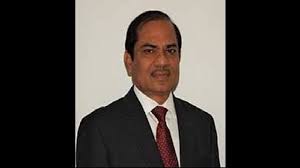Sanjay Kumar Agarwal takes charge as CBIC Chairman

Sanjay Kumar Agarwal takes charge as CBIC Chairman: IRS officer Sanjay Kumar Agarwal has taken charge as the Chairman of the Central Board of Indirect Taxes and Customs (CBIC). Agarwal takes over for Vivek Johri, who retired as CBIC chairman on May 31. The finance ministry appointed Agarwal, who was in head of CBIC member compliance management, to investigate in an order issued on August 5.
Daily Current Affairs Quiz: August 2023
The CBIC, which deals with policy making in indirect taxes — GST, customs, excise — is headed by a chairman and has six members in the board. The board is assisted by principal chief commissioners/chief commissioners and principal director generals/ director generals.
About the Central Board of Indirect Taxes and Customs (CBIC)
The Central Board of Indirect Taxes and Customs (CBIC) is a statutory body under the Ministry of Finance, Government of India. It is in charge of administering indirect taxes in India, such as customs, central excise, service tax, and goods and services tax (GST). The CBIC is also in charge of combatting tax evasion and smuggling.
- The CBIC was established in 1947, following the independence of India. It was originally called the Central Board of Revenue (CBR). The CBR was responsible for the administration of all taxes in India, including direct taxes and indirect taxes. The CBR was divided into two boards in 2000: the Central Board of Direct Taxes (CBDT) and the Central Board of Indirect Taxes (CBIC). The CBIC assumed responsibility for the administration of indirect taxes.
- The CBIC is headed by a Chairman, who is an Indian Revenue Service (IRS) officer of the rank of Additional Secretary to the Government of India. The Chairman is assisted by a number of members, who are also IRS officers. The members are responsible for different areas of work in the CBIC, such as customs, excise, service tax, and GST.
- The CBIC has a number of offices located all over India. The headquarters of the CBIC is located in New Delhi. The CBIC also has regional offices, zonal offices, and field formations.
- The CBIC is a very important organization in the Indian government. It is responsible for collecting a significant amount of revenue for the government. The CBIC also plays a vital role in preventing tax evasion and smuggling.
Here are some of the key functions of the CBIC:
- Administering indirect taxes in India
- Preventing tax evasion and smuggling
- Formulating policy recommendations for indirect taxes
- Implementing laws and regulations related to indirect taxes
- Providing training to officers and staff of the CBIC
- Conducting research on indirect taxes
The CBIC is a dynamic organization that is constantly evolving. It is committed to providing efficient and effective administration of indirect taxes in India. In addition, the CBIC is dedicated to combatting tax evasion and smuggling. The CBIC is critical to India’s economic development.
Important takeaways for all competitive exams:
- CBIC Chairperson: Vivek Johri;
- CBIC Founded: 1 January 1964.